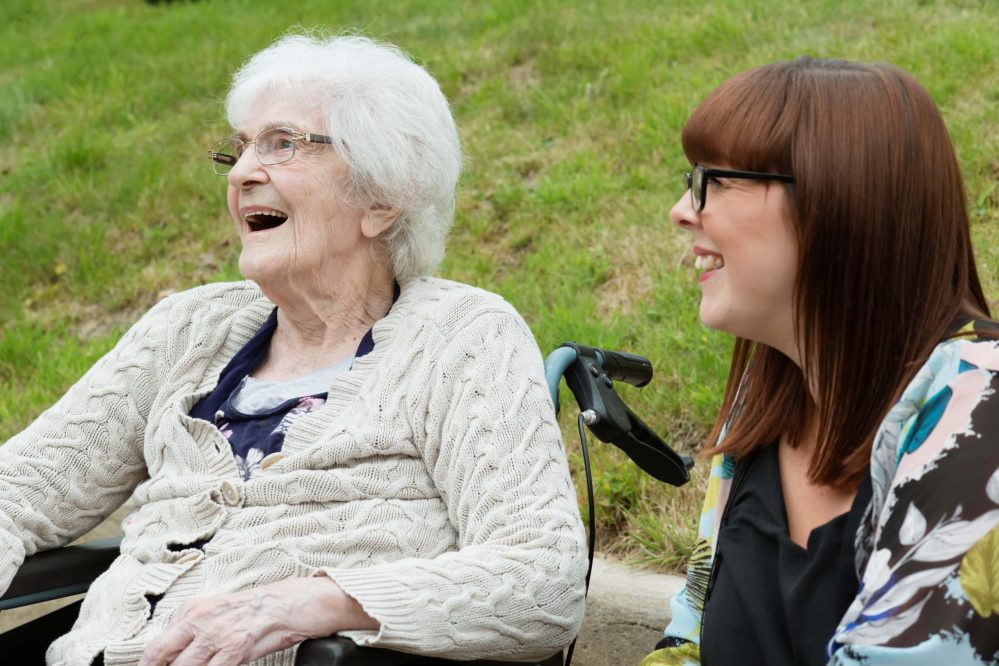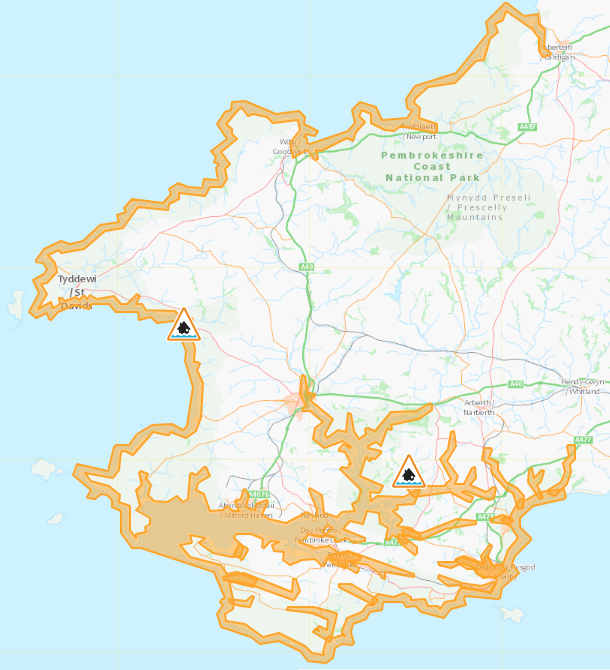Community
Delays in accessing social care are reducing but still too long finds Age Cymru report

COUNCIL initiatives to reduce waiting times for older people needing social care in Wales are beginning to bear fruit and, in another welcome development, the surge in demand for care post pandemic has now reduced, finds an Age Cymru report Why Are We Still Waiting? (WAWSW)
This is Age Cymru’s third annual report on delays in accessing social care in Wales for people aged 55 and over.
However, despite these welcome developments nearly one in four (24%) of older people are still waiting more than 30 days for a social care assessment, with the longest wait being 639 days. While one in six (16%) are waiting more than 30 days for a social care package to be implemented.
The challenge facing local authorities in Wales remains high as the report found that individual older people have increasingly complex needs and as the population ages service providers will have to continue to adapt their services.
WAWSW found that communication from councils with older people and their families must also improve as there were instances where people were not given the right information when they first approached social care which meant they didn’t get the appropriate help when they needed it.
The research also discovered poor communication between hospital and social care staff which meant that some older people remained in hospital longer than needed, making an already difficult time for older people and their families unduly stressful.
And poor communication was found to be the source of frustration for many families trying to get to grips with the charging arrangements for social care within the challenging environment of a cost-of-living crisis. There is concern that some older people may be paying above the amount allowed under the Welsh Government’s Fairer Charging arrangements.
Disappointingly plans to provide better help for unpaid carers have struggled to progress and initiatives continue to be hampered by a lack of long term, sustainable funding.
The report’s author, Age Cymru Policy Officer Helen Twidle, welcomed the efforts made by councils tackling the challenge of providing social care to an ageing population with complex care needs but called for significant improvements in many areas.
Helen Twidle says “Local authorities need to focus on those individuals who are waiting more than 30 days to have a care package in place as a person’s mental and physical health can deteriorate rapidly while they wait for support.
“There also needs to be a focus on how information is communicated to older people and their families, especially around the complexities of charging.
“Regional Partnership Boards, local authorities and third sector services need to work better together to improve the availability of earlier intervention and prevention support for older people.”
Minister for Social Care, Dawn Bowden, said: “I am pleased that waiting times for older people needing social care in Wales have fallen over the last 12 months, however we are aware there is much more to do.
“We remain committed to improving outcomes for older people through early intervention and integrated care in the community, with more than £145 million provided to local authorities, health boards and third sector organisations through the Regional Integration Fund. Our investment into creating Age Friendly communities is also enabling more older people to be active in their local communities and to access a range of healthy ageing activities.
“We will continue to work with Age Cymru to understand the experiences of older people accessing social care and to ensure they can access the support they need when they need it.”
Community
Wales launches plan to become ‘Carer Aware’ nation

Consultation invites unpaid carers across the country to shape new national strategy
THE WELSH GOVERNMENT has unveiled plans to make Wales a “Carer Aware” nation, with a new public consultation launched today (Monday, Feb 2) aimed at improving recognition and support for the country’s thousands of unpaid carers.
Ministers say the move is designed to ensure people who look after relatives, friends or neighbours are identified earlier and treated as partners in decisions about the care of their loved ones.
A draft National Strategy for Unpaid Carers has been developed with input from hundreds of carers and representative groups across Wales. It sets out eight key priorities, including better recognition of carers’ roles, improved access to respite and short breaks, stronger wellbeing support, and measures to prevent young carers from carrying too much responsibility.
Under the proposals, carers of all ages and backgrounds — including disabled carers and those in minority communities — would be able to access clear, local information and help when they need it.
Officials say earlier identification is critical, so carers can receive advice, financial guidance and emotional support from the start of their caring journey, rather than only at crisis point.
The strategy also stresses the need for sufficient alternative care arrangements to allow carers time to rest and protect their own health.
Dawn Bowden, Minister for Children and Social Care, said many carers do not even see themselves as carers.
“Too often, unpaid carers go unrecognised – even by themselves. They’re simply ‘looking after mum’ or ‘helping out a friend’, but caring can have a profound impact on people’s finances, careers, health and wellbeing,” she said.
“We want Wales to be a place where carers are identified early, where they know their rights, and where they’re treated as partners for the person they care for.
“This consultation is important in shaping a strategy which takes into full account how carers feel and how they’re supported. I’d encourage everyone with an interest to provide their views.”
The consultation is open now and runs until April 13, with responses helping to shape the final strategy and future support services across Wales.
People can take part online via the Welsh Government website.
Community
Flood alert issued for Pembrokeshire coast this evening

Pembrokeshire residents are being urged to prepare for possible flooding along the coastline between St Dogmaels, Cardigan and Amroth, after Natural Resources Wales issued a Flood Alert.
The alert warns that rising water levels could pose a risk to homes, vehicles and livestock, and advises people to take precautions now. Authorities are reminding residents to follow their flood plans, check on family, friends and pets, and ensure essential items and documents are protected.
Residents are also advised to keep mobile phones charged, know how to turn off electricity, gas and water supplies, and prepare a small emergency bag with items such as medication, warm clothing, baby and pet care essentials, and insurance documents. Vehicles, livestock and equipment should be moved from areas likely to flood if possible.
Safety warnings are clear: do not drive or walk through floodwater. Just 30 cm (1 foot) of water can carry a car away, and 15 cm can knock a person off their feet.
For more information, residents can visit Natural Resources Wales – Flood Warnings, check river and sea levels online, or contact Floodline on 0345 988 1188 (quick dial 503013). Updates are also available via @NatResWales on social media.

Community
Lottery boost for HMS Erebus exhibition in Pembroke Dock

Heritage Centre secures £57,015 to mark 200 years since famous polar exploration ship was built in the town
THE PEMBROKE DOCK HERITAGE CENTRE has secured £57,015 from The National Lottery Heritage Fund to create a major new exhibition celebrating the extraordinary story of HMS Erebus, one of the most famous exploration vessels ever built in Wales.
The exhibition, titled HMS Erebus: From Dockyard to Discovery, will open to the public on Monday 8 June 2026, marking exactly 200 years since the ship was launched at Pembroke Dock’s Royal Dockyard.
Constructed in 1826 by local shipwrights, Erebus stands as a powerful symbol of the town’s maritime heritage and the exceptional craftsmanship that once made Pembroke Dock a centre of naval excellence. From its origins in a small Welsh dockyard, the vessel went on to play a central role in some of the most significant expeditions of the nineteenth century.
She later served on the pioneering Ross Antarctic expedition before joining Sir John Franklin’s ill-fated Arctic voyage, where both ships and crew were lost. The dramatic rediscovery of the wreck beneath Arctic waters in 2014 reignited global interest in one of exploration’s greatest mysteries.
For the first time, rare artefacts recovered from the wreck — on loan from the Royal Navy Museum — will be displayed to the British public, offering visitors a direct and tangible connection to life on board and the harsh realities of polar exploration.
The new exhibition will also place Erebus within the wider story of the Georgian dockyard community that built her, highlighting Pembroke Dock’s role in Britain’s naval expansion and the skilled workforce that shaped its history.
Visitors can expect bilingual interpretation, digital interactives, an immersive Arctic diorama with a scale model of the ship, and dramatic underwater footage of the wreck site provided by Parks Canada. The displays will also link historic exploration with modern conversations about climate change and the fragility of polar environments.
Community engagement is central to the project. Local schools will help co-produce elements of the exhibition, while oral histories and shared memories will ensure the story reflects both the past and the present community.
Andrew White, Director of The National Lottery Heritage Fund – Wales, said: “This project will help people better understand Pembroke Dock’s vital role in maritime history while creating new opportunities for communities to engage with their heritage in meaningful and inspiring ways. Thanks to National Lottery players, this exhibition will bring an internationally significant story back to the place where it began, ensuring it is shared with future generations.”
John Evans, Patron of Pembroke Dock Heritage Centre, said: “We are thrilled to receive this support. Thanks to National Lottery players, we can preserve and celebrate a story of national and international importance, while re-establishing Pembroke Dock as a place of discovery, craftsmanship and exploration. By reconnecting HMS Erebus with the community that built her, we hope to inspire pride, learning and long-term cultural and economic benefit for the town.”
HMS Erebus: From Dockyard to Discovery opens on Monday 8 June 2026.
-

 Health4 days ago
Health4 days agoConsultation reveals lack of public trust in health board
-

 News5 days ago
News5 days agoCaldey still unsafe, survivors warn — despite Abbey’s reform claims
-

 Community5 days ago
Community5 days agoPembrokeshire students speak at national Holocaust Memorial Day event
-

 Local Government7 days ago
Local Government7 days agoTribunal over former Neyland councillor’s conduct adjourned
-

 News5 days ago
News5 days agoKurtz raises Gumfreston flooding in the Senedd as petition deadline nears
-

 Crime6 days ago
Crime6 days agoMan denies murdering brother as jury hears of ‘ferocious attack’ at Morriston flat
-

 Community4 days ago
Community4 days agoCampaign to ‘save’ River Cleddau hits over 2,200 signatures
-

 Community6 days ago
Community6 days agoStorm Chandra: Morning impacts across Pembrokeshire























